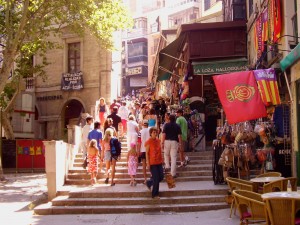I know for sure that people in all parts of Spain appreciate it very much when a tourist makes the effort to speak Spanish. I think that it is a clear sign of respect and gratitude and Spanish people are all too aware of the challenges involved in studying and speaking a foreign language. We start learning English at school here in Spain, but the majority of people are quick to forget whatever little they learned. Speaking a foreign language with native speakers takes guts and even a few simple words go a long way.
In saying this, however, it is true that many Spanish people in areas such as the Costa del Sol or the Costa Blanca will often move the conversation towards English if they notice that their level of English is better than the tourist’s level of Spanish. Places like Malaga and Torrevieja are not only popular tourist draws all year round due to their fine weather; their permanent populations have also become incredibly cosmopolitan. In addition to the vast amount of British people living there, there are also many Germans, Scandinavians, and Eastern Europeans. English tends to be used to communicate between these nationalities even more than Spanish and therefore English has become an essential requisite for employment.
As a result, many Spanish people from the Costa del Sol and the Costa Blanca are able to defend themselves very well in English and are accustomed to meeting people who do not speak very much Spanish. To save time they will tend to move the conversation towards English quite quickly after exchanging the usual few pleasantries such as “Hola, ¿cómo estás?”, “Muy bien. ¡Gracias!”. This can be frustrating for those people who are avidly studying Spanish and looking for every opportunity to practice with native speakers.
My husband is English and he has been living in Spain with me for about six years now and he experienced this dilemma a few years back while he was still working on his Spanish. At first, of course, it was nice for him to find the safety net of a native Spanish speaker who could also speak English, but after a while he grew tired of the other person constantly cutting off his practice sessions as soon as they caught wind of his English accent. He developed his own technique for dealing with this that served him very well, whereby he looked upon every such encounter as a duel. It was his goal to “out-speak” the other person by being the one who lasted longer in the conversation before reverting to his or her mother tongue.
Where I come from, in the north of Spain, there are relatively few tourists and even fewer foreign residents and for this reason English is heard a lot less often on the streets. Take note: Spanish students are likely to get a lot more practice speaking Spanish in northern and central Spain! Meeting a foreigner is much more of a novelty there and meeting one who makes the effort to converse in your language is always a great pleasure. People will usually go out of their way to speak slowly and clearly and to give their guest every encouragement. I know very well from my experiences learning to speak English whilst living in England that it is far from easy to speak a foreign language, but I also know that people in general are so appreciative and welcoming when you make the effort.
So my next post will be more info about visiting Northern Spain and yes, I’ll reveal my mystery expert.





[…] promised in my post about Speaking Spanish while traveling that I would tell you the source of my info. It is Laura, who writes The Spanish Blog and lives in […]